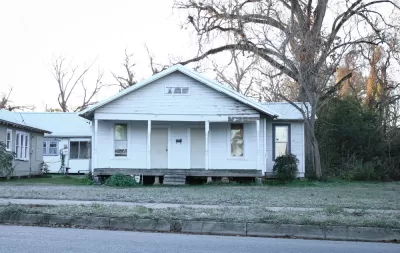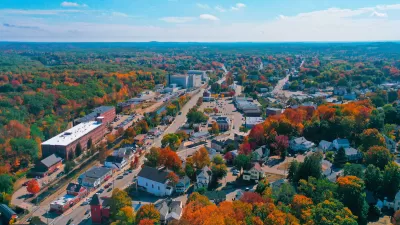While housing shortages in major cities are grabbing headlines, rural communities are seeing higher rates of growth in housing prices and a silently spreading homelessness crisis.

The term ‘housing crisis’ brings to mind cramped urban apartments and tenants clamoring to sign a lease on an exorbitantly expensive piece of city living, or makeshift encampments sheltering unhoused people under a freeway overpass. But, according to an article in The Daily Yonder by Taylor Sisk and Jan Pytalski, a quieter, more insidious crisis is growing in America’s rural regions, where rising housing costs, changing demographics, and stagnant incomes are pushing many families into homelessness.
Exacerbated by the pandemic, when professionals suddenly free from the confines of the physical office sought affordable homeownership, open space, and a small-town feel away from large city centers and suburbs, rural America’s housing shortage is putting a growing strain on longtime residents and newcomers alike.
Rural homelessness, says Adrienne Bush, director of the Homeless & Housing Coalition of Kentucky, is often less conspicuous than its urban counterpart. “It expresses itself through housing insecurity, folks doubled up with friends or family, people couch surfing because they don’t have a place of their own,” Bush explains.
But the crisis is growing fast: “Nationwide, homelessness rose less than a half percent from 2020 to 2022 but almost 6% in rural communities.” Meanwhile, a dearth of large-scale development in rural areas means the cost of construction is higher, making development less profitable.
The article describes efforts in some rural towns to stem the crisis and provide housing and shelter for residents, such as the Gary Leif Navigation Center in Roseburg, Oregon, a shelter that provides a variety of services for unhoused residents. In Kentucky’s Perry County, Kentucky River Community Care provides mental health services and housing opportunities. Activists in rural communities express optimism that the problem, which is often acute but on a much smaller scale than in larger cities, is largely solvable if given enough resources. However, the uncertainty of the post-pandemic housing and labor market leaves the future of rural housing unclear.
FULL STORY: Tackling Rural America’s ‘Hidden’ Housing Crisis

Maui's Vacation Rental Debate Turns Ugly
Verbal attacks, misinformation campaigns and fistfights plague a high-stakes debate to convert thousands of vacation rentals into long-term housing.

Planetizen Federal Action Tracker
A weekly monitor of how Trump’s orders and actions are impacting planners and planning in America.

San Francisco Suspends Traffic Calming Amidst Record Deaths
Citing “a challenging fiscal landscape,” the city will cease the program on the heels of 42 traffic deaths, including 24 pedestrians.

Adaptive Reuse Will Create Housing in a Suburban Texas Strip Mall
A developer is reimagining a strip mall property as a mixed-use complex with housing and retail.

Study: Anti-Homelessness Laws Don’t Work
Research shows that punitive measures that criminalized unhoused people don’t help reduce homelessness.

In U.S., Urban Gondolas Face Uphill Battle
Cities in Latin America and Europe have embraced aerial transitways — AKA gondolas — as sustainable, convenient urban transport, especially in tricky geographies. American cities have yet to catch up.
Urban Design for Planners 1: Software Tools
This six-course series explores essential urban design concepts using open source software and equips planners with the tools they need to participate fully in the urban design process.
Planning for Universal Design
Learn the tools for implementing Universal Design in planning regulations.
Heyer Gruel & Associates PA
JM Goldson LLC
Custer County Colorado
City of Camden Redevelopment Agency
City of Astoria
Transportation Research & Education Center (TREC) at Portland State University
Jefferson Parish Government
Camden Redevelopment Agency
City of Claremont





























